Deforestation photo by luoman/Getty Images, pollution photo by Максим Шмаков/Getty Images, and text illustration by Toltemara/Getty Images; all other credits below.
By Andrew Thurston
COVID-19, continued white violence against Black people, economic hardship. When we asked CAS researchers and experts what they planned to do differently after a heartbreaking, often dispiriting, year, they told us about new projects to make work fairer, to protect renters, to depopulate prisons, and to make cities greener. For those whose research has long covered issues of race, the question was less about what they might do differently and more about continuing a protracted push for justice.
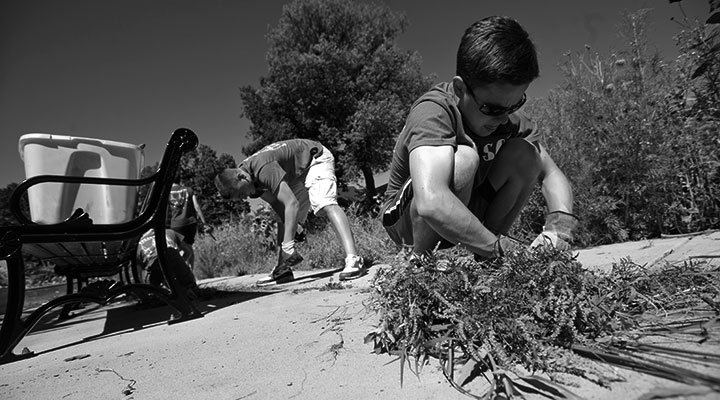
Photo by Cydney Scott
Educate Students to Make a Difference
Seth Blumenthal teaches the historical roots of contemporary problems—then mandates students volunteer to create modern solutions.
In Seth Blumenthal’s educated electorate class, students are required to volunteer with political groups and nonprofits. “Young people are both inspired and overwhelmed by the world they are inheriting,” says Blumenthal, a senior lecturer in the Writing Program and a winner of BU’s highest teaching honor, the Metcalf Award. He teaches them not just about the historical roots of the problems they’re passionate about, but gives them the skills they need to “create a more just society on campus and beyond.” His classes cover the latest tactics, technologies, and organizational strategies used by political activists, while course reference materials include information on local grassroots groups, legislative voting records, and public opinion polls. “Students’ voices need to be heard now more than ever, and I am excited to help them find ways to channel this energy into making an impact on the issues that concern them most.”
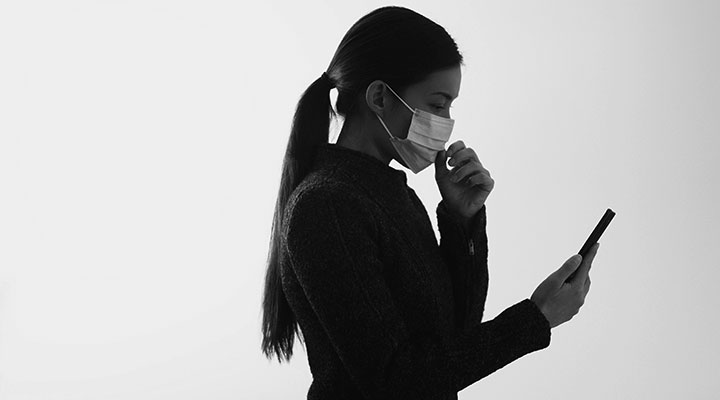
Photo by Maridav/Getty Images
Use Tech for Good—and Protect Privacy
Ran Canetti developed a COVID-19 tracing app that protects user privacy; he wants to ensure such technological advances are used only for good.
In April, three BU computer scientists helped develop a contact tracing smartphone app that could warn users if they’d been exposed to someone with COVID-19—while also protecting their privacy. According to Ran Canetti, a professor of computer science and one of the app’s developers, the ability to transmit anonymous information between users, without the need for a shadowy centralized database, is increasingly important. “Automated contact tracing and exposure notification is just one example of the challenges that we are facing as a society in making good use of information technology,” says Canetti. “We want to be able to advance our lives, health, education, entertainment, and self-fulfillment as individuals, while at the same time protecting ourselves and our society from actors that use the same technology to sow fear and confusion and to control others: repress freedom, violate human rights, and abuse power.” As well as using the technology to fight a pandemic, Canetti is working on a legal framework for what computer scientists call zero-knowledge protocols. They allow one user to prove a fact to someone else—that they’ve paid their taxes, for example—without sharing their private information, such as actual earnings.
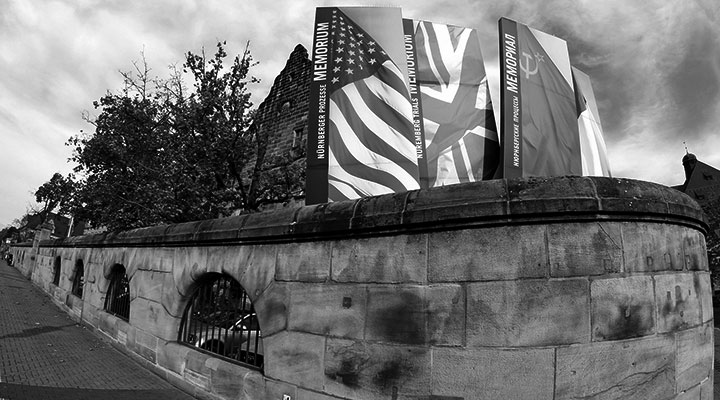
Photo by Karl-Friedrich Hohl/Getty Images
Listen to Past Trauma
Louis Chude-Sokei has developed a nonracist artificial intelligence algorithm and explores history through sound.
The singer on the new album by the German electronic band Mouse on Mars can’t sign autographs or run on stage for an encore: it’s an artificial intelligence algorithm codeveloped by the group and Louis Chude-Sokei. “It’s rooted in antiracist work and will—strangely enough—be modeled after my work and speak in my voice,” says Chude-Sokei, a professor of English and holder of the George and Joyce Wein Chair in African American Studies. Sound and technology have long been central features of his research on the African Diaspora. In addition to collaborating with Mouse on Mars, he’s written about pioneering reggae producers in a book on race and technology and explored historical memory through sound. For one of his ongoing projects, History is Listening, Chude-Sokei travels to “historical sites of trauma or violence, as well as sites of national or cultural memorialization, to explore what we can learn via techniques of listening, particularly field recording, as well as other site-specific engagements with spaces, monuments, and sonic archives.” He was recently awarded $80,000 to curate a yearlong project in Nuremberg, Germany, site of Nazi rallies and postwar trials. “Though the questions of national memory via statues and changing names and reckoning with a racist history are present now,” says Chude-Sokei, “they have been central to my work for a very long time. Folks may be now refocusing on how to improve things, but I find it odd if they weren’t already doing so.”
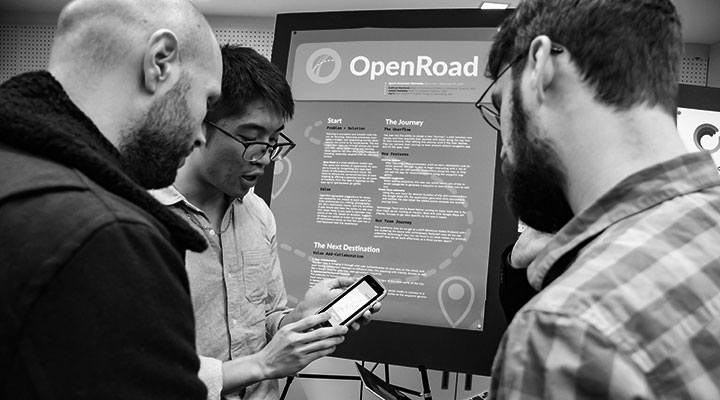
Photo by Sahana Sreeprakash (ENG’22)
Use Data Science to Promote Equity
A BU-based technology incubator will use data science to tackle issues of diversity and inclusion.
BU Spark! is a technology incubator that gives students the space to develop their own entrepreneurial ideas or work on computer science and software engineering projects with external partners, such as Nike and the American Civil Liberties Union. In the past, students have used their time with the incubator, which is part of BU’s Faculty of Computing & Data Sciences, to develop parking space apps, hotel feedback programs, and a website to promote women’s clothes with practical pockets. But now, says founding director Ziba Cranmer, BU Spark! is sharpening its focus on society’s most pressing problems with the launch of new impact labs, which will target topics related to COVID-19 and racism. “We will start by launching the Equity Data Science Lab to support research, projects, and the publication of datasets focused on issues of equity,” says Cranmer. “We hope by engaging diverse stakeholders in this effort, we will be part of creating research that matters and advancing BU’s commitment to diversity, equity, inclusion, and antiracism.” She says projects will include research for BU’s new Center for Antiracist Research and the School of Law’s Immigrants’ Rights and Human Trafficking Program.

Photo by Bill Oxford/Getty Images
Help Renters and Homeowners
Katherine Levine Einstein is investigating housing relief efforts and joining with communities to help those in danger of losing their homes.
For the past seven years, Katherine Levine Einstein and her political science colleagues have surveyed America’s mayors, asking them how they approach issues such as income inequality and climate change. This year, Einstein says the annual Menino Survey of Mayors, which is supported by the BU Initiative on Cities, asked local leaders “about their strategies for addressing COVID-19, policing, and racial injustice—and how these forces may jointly reshape the future of American cities.” The results are due to publish this fall, but Einstein is already digging into what cities are doing to mitigate the impact of the COVID-19 recession, particularly on renters and homeowners. With Assistant Professor Maxwell Palmer, she’s studying local housing relief efforts. “We have assembled a team of BU undergraduates to collect information on eviction protections and rent and mortgage relief programs,” says Einstein. “We are also working with community partners on how to best communicate these programs to the people who most need them.”

Photo by LeoPatrizi/Getty Images
Next Time, Reopen the Right Way
Most states reopened too early and sent COVID-19 cases skyrocketing; Randall P. Ellis is developing statistical models that will inform better decisions.
One of the many challenges states faced this past summer was choosing when to end their coronavirus lockdowns. Plenty got it wrong, with residents pouring into bars and onto beaches—then overwhelming hospitals as the virus took advantage of relaxed social distancing. Health economist Randall P. Ellis is leading a team of students to develop statistical models that should help state leaders figure out the best time to emerge from any future lockdowns. They’re creating a model that uses 2020 COVID-19 insurance claims to predict the virus’ seasonality. It’s a method that Ellis, a professor of economics, had previously used to build models that document the seasonal ebb and flow of influenza, pneumonia, and other infections. Those were used to help health policymakers predict healthcare spending levels, says Ellis, but the COVID-19 model could “help states figure out the importance of timing of school openings, participatory sports at schools and colleges, vacation breaks, tourism, and time indoors and outdoors, which will also be useful to parents.”

Photo by Martyna87/Getty Images
The Past Foreshadows the Future
Economic historian James Feigenbaum’s research shows how the inequalities of yesterday repeat today.
As an economic historian whose scholarship has primarily focused on the early twentieth century, James Feigenbaum acknowledges his research isn’t always intended to be timely. But much of his work—on inequality, intergenerational mobility, and racial disparities—resonates in the present. He gives the example of a project to study the negative impact of lead pipes in the early 1900s. “Generations of city children were exposed to a dangerous neurotoxin with dire consequences for crime and violence,” says Feigenbaum, an assistant professor of economics. “The tragic poisoning in Flint—drinking water laced with lead from lead pipes—gave our findings terrible contemporary relevance.” He says the unequal death toll from COVID-19—with people of color disproportionately more likely to become infected—is also sadly familiar. “In work with a multidisciplinary team that includes an economist, a sociologist, and an epidemiologist, we have documented the unequal burden of infectious disease historically,” says Feigenbaum. “From 1906 to 1920, African Americans in American cities faced such death rates that it was as if they endured the 1918 great influenza pandemic every year.”
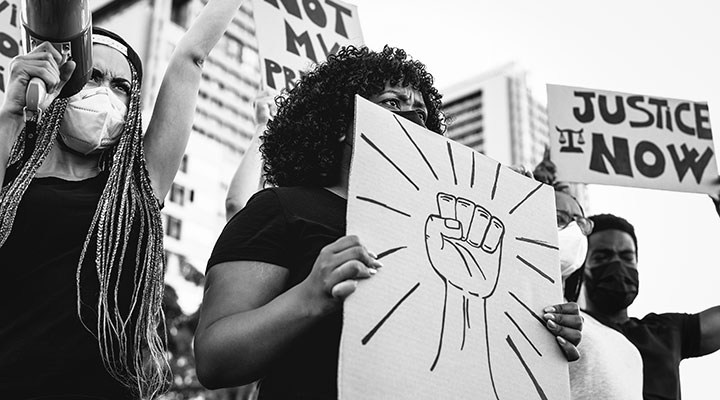
Photo by Alessandro Biascioli/Getty Images
See the Full Picture of White Violence
Saida Grundy looks beyond police brutality to highlight acts of white state violence that can’t be captured in short videos.
Saida Grundy, an assistant professor of sociology and African American studies, wants people to consider what they mean when they say “Black Lives Matter.” Those who just include acts of police brutality, she says, aren’t seeing the full picture of white violence against Black people: they miss the “economic violence done to Black households and children.” These problems, she says, can’t be captured in a short video, but are no less lethal than the acts of police violence shared so widely this year. “Issues of state violence have been primarily constructed around what straight Black men experience,” says Grundy. “Police brutality is graphic: it’s often—but not often enough—recorded, it’s visually tangible as a form of injustice. But it’s the tip of the iceberg in terms of the forms of state violence that Black people experience. Much more often, white violence is legislative and weaponized through policies. But that kind of violence can be polite. It often goes by names like ‘austerity’ or ‘fiscal conservatism,’ but the effects are devastating in terms of the forms of violence done through housing, economics, food, health, and schools on Black lives. Because we so often don’t prioritize the problems that disproportionately face Black women, LGBTQ Black people, and low-income Black people, we actually are only seeing the tip and not the berg of white state violence.”
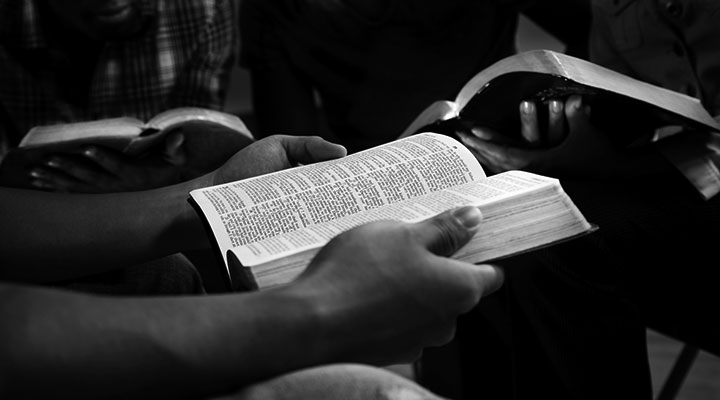
Photo by fstop123/Getty Images
Listen to Silenced Voices
Margarita Simon Guillory says the nation cannot move forward until it listens to the voices of peoples and cultures deliberately silenced.
“I have sought to combat the historical silencing of African American religious experiences in the US,” says Margarita Simon Guillory, an associate professor of religion and expert on Africana religions. Whether she’s studied the abolitionist role of African American spiritualists or the ways witches of color use social media, Guillory says the driving force for her work has been the same: “to recover Africana religious experiences that have undergone varying degrees of historical repression. Recovery of this kind is meant to complicate and to further diversify American historicity of religion, but not at the expense of forgetting how colonialism and conquest led to the repression of certain cultures and peoples.” For her, a better future in America is “contingent on reconstructing these more nuanced historical narratives, ones marked by deliberate acts of resistance and recovery. How can we move forward when some voices of the past are still muted? That’s the question that I will continue to address for years to come.”
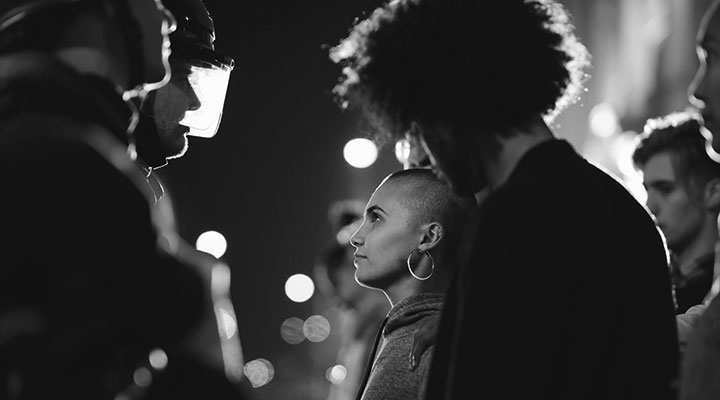
Photo by jacoblund/Getty Images
Tackle Police Bias
To better understand why some disagreements get physical, Carolyn Hodges-Simeon studies not what people say, but how they say it.
This has been a year of conflict—between neighbors, politicians, police officers, and protesters—but what causes a verbal disagreement to spill over into a physical one? A clue might be in the pitch of the protagonists’ voices. In 2016, evolutionary anthropologist Carolyn Hodges-Simeon began a National Science Foundation–funded study to understand how a voice’s pitch and other nonverbal aspects of speech contribute to interpersonal conflict. “We have been using insights from nonhuman animal conflict to shed light on the dynamics of human antagonistic interactions,” says Hodges-Simeon, an assistant professor of anthropology. “Our previous work on both police and civilians highlights the role of lowered voice pitch in predicting perceptions of speakers’ aggressive intent, which can then lead to listener aggression and escalation.” They’re now moving the research into a second phase: “the intersection of skin color and vocal parameters on police perceptions of aggressive intent,” says Hodges-Simeon. “We are committed to the idea that greater awareness of our biases can lead to conscious intervention and mitigation of those biases.”

Photo by deberarr/Getty Images
Grow Greener Cities
COVID-19 lockdowns sent CO2 levels plummeting; Lucy R. Hutyra is working to make cities greener and keep skies clear.
In April 2020, Lucy R. Hutyra found the COVID-19 lockdown had reduced Boston’s carbon emissions by 15 percent. An international study later found a similar global impact, which led many to wonder whether seeing clearer skies might inspire us to keep CO2 emissions down for good. “While a global pandemic is a horrible way to control air pollution,” says Hutyra, an associate professor of Earth and environment, “it has given us a chance to reimagine environmental quality and our interactions with the built environment.” In past research, she’s discovered urban trees play an outsized role in the carbon cycle compared to those in more rural locations. “In 2021, my group will work to imagine, measure, and model greener cities with expanded tree canopies, cooler temperatures, and reenvisioned transportation systems.” Hutyra plans to study how an expanded urban tree canopy could help cool cities, improve environmental quality, and contribute to more walkable and inclusive communities.

Photo by andipantz/Getty Images
Stop Deforestation to Prevent Pandemics
Les Kaufman says reducing deforestation could cut the chances of new diseases leaping from animals to humans.
As people encroach on tropical forests—through logging, ranching, trading, and more—the chances of a novel disease leaping from animals to humans increase. In a recent study, Les Kaufman, a professor of biology, found that investing in wildlife monitoring and reducing deforestation could help prevent future costly pandemics. Working with a team of experts from across the world, Kaufman discovered that significantly reducing transmission of new diseases from tropical forests would cost, globally, between $22.2 and $30.7 billion each year. In contrast, the researchers found that the COVID-19 pandemic will likely end up costing between $8.1 and $15.8 trillion globally. “The pandemic gives an incentive to do something addressing concerns that are immediate and threatening to individuals, and that’s what moves people,” says Kaufman. “There are many people who might object to the United States fronting money, but it’s in our own best interest.”–Jeremy Schwab

Photo by Chainarong Prasertthai/Getty Images
End the Blame Game on Poverty
Nazli Kibria is sharing individual stories of economic decline to counteract the fallacy that poverty is a choice.
In June 2020, the World Bank announced COVID-19 would plunge the global economy into its worst recession in 75 years. Nazli Kibria aims to document the personal toll of that economic collapse on individuals and families. With Karen V. Hansen, a sociologist at Brandeis University, Kibria will interview people who’ve suffered an economic shock in the past decade, then share their stories to highlight the underlying causes of poverty and inspire others to have empathy for their situations. The project is supported by a Voices for Economic Opportunity Grand Challenge Grant, awarded by the Gates and Raikes Foundations. “The events of 2020 have inspired me to take steps to ensure that my research both analyzes and addresses the entrenched social inequalities and injustices that surround us,” says Kibria, a professor of sociology whose past research has covered issues of family, immigration, race, and childhood. “We will also harness the capacity of young people to change public opinions and narratives that blame individuals for poverty by holding workshops with high school students to generate and disseminate life histories of loss, resilience, and resistance.”
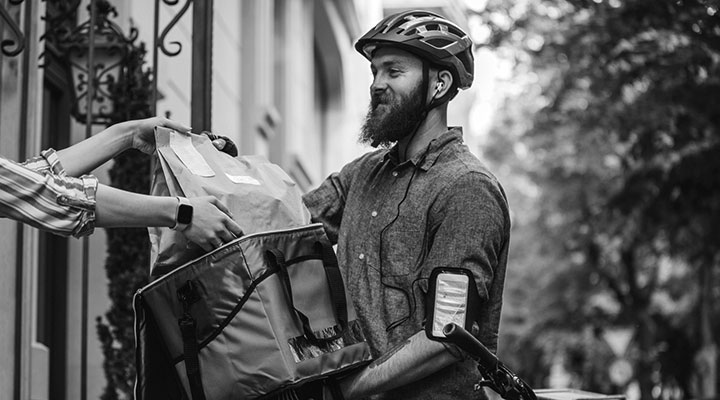
Photo by svetikd/Getty Images
Reimagine the Gig Economy
Ashley Mears studies jobs that lack predictable hours and pay to help make work more secure and just.
In May, Time reported that gig economy workers had seen their earnings tumble because of COVID-19. As unemployment rose, more people turned to freelance work, increasing competition for driving and shopping gigs and pushing down rates. CNN later warned that after COVID-19, “we may be in a volatile gig economy” for the long haul. Ashley Mears, an economic sociologist, is studying what she calls “bad jobs”—those with unpredictable hours and pay and no benefits—with the goal of making work fairer for all. “I study the underbelly of glamorous worlds of work, from fashion modeling to high-end nightclubs,” says Mears, an associate professor of sociology and women’s, gender, and sexuality studies. She says financially and structurally insecure positions have become more common—in low- and high-skilled occupations—since the 1980s. “In most cases, the coder, the adjunct, and the bartender have few protections against market risks.” With Heba Gowayed, an assistant professor of sociology, and a team of graduate students, Mears recently began interviewing bar workers about the impact of the COVID-19 recession. “We hope our research in this moment of crisis can help shape the conversation on workers’ social protections, and how we as a society can reimagine terms of work that are socially secure and just.”
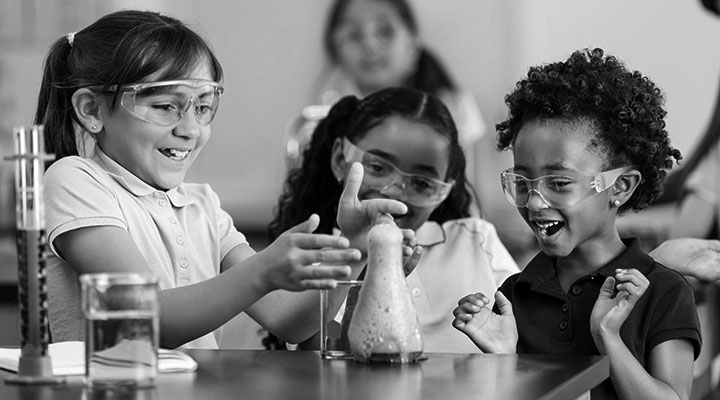
Photo by SDI Productions/Getty Images
Diversify Science
Merav Opher is launching a new center to study the solar system’s protective bubble and open science to underrepresented groups.
The solar system has a protective bubble, called the heliosphere. It’s like a magnetic force field keeping out destructive charged particles. For years, space physicists have debated what shape it is: like a comet or more like a crescent. In March 2020, Merav Opher, a professor of astronomy, helped reimagine the bubble: she found it’s shaped like a cross between a sphere and a croissant. It’s research that’s continuing through the new BU-based SHIELD DRIVE Science Center, a lab Opher says will couple science with a push for greater diversity in STEM fields. “We propose to develop a multifaceted outreach program to reach from K–12 all the way to faculty,” says Opher, “with the goal of training, recruiting, and retaining underrepresented populations.”

Photo by OwenJCSmith/Getty Images
Decarcerate America
Spencer Piston wants to help students and alums push BU to do more to reduce prison populations.
Spencer Piston studies the politics of racial and economic inequality with a focus on what the public does to fight against them—or maintain them. They’re issues he says BU can do better on, particularly when it comes to people who are incarcerated. “I will support student and alumni groups encouraging BU to do its part,” says Piston, an assistant professor of political science. He plans to help these groups lobby the state to reduce prison populations and to push BU to “advocate for the rights of incarcerated students in BU’s Prison Education Program; to assist with the effort to find housing for currently incarcerated people; to cut ties with the racist Boston Police Department; to cut ties with Aramark, a dining services company that profits from the prison-industrial complex; and to follow the example of universities around the country by curtailing or disbanding its police department.”
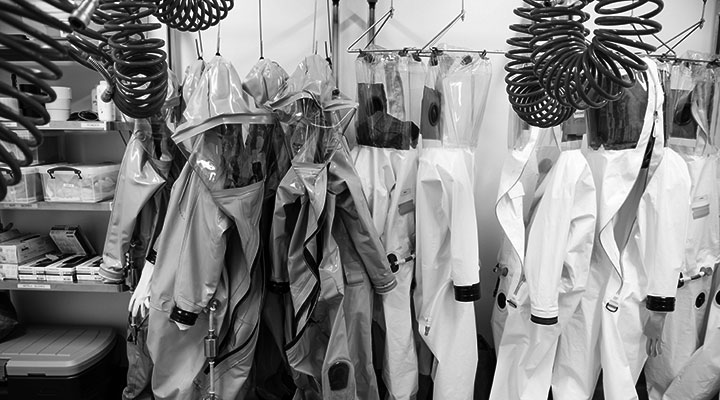
Photo by Cydney Scott
Test New Molecules to Defeat Viruses
John A. Porco, Jr. is bringing together scientists from different disciplines to find new antiviral drugs.
At the BU Center for Molecular Discovery, scientists from across the University come together to make and test molecules with disease-fighting potential. The center also maintains an open-source library of drug-like molecules that researchers can access for free. Before COVID-19, researchers at the center—which connects the chemists who make molecules with the biologists who test them—had been working on a plan to join with the BU National Emerging Infectious Diseases Laboratories to pit the molecules in its library against a number of viruses. In spring 2020, they launched the initiative with a SARS-CoV-2 screen. “A number of highly potent compounds with strong antiviral activity against SARS-CoV-2 have been identified,” says John A. Porco, Jr., a professor of chemistry and the center’s director. His team is also working with John H. Connor, an associate professor of microbiology, says Porco, on the “development of a broad-spectrum antiviral agent for use against a range of viruses, including SARS-CoV-2.” He believes the work on COVID-19 has reinforced the need for interdisciplinary teams in drug discovery. “We are very motivated to continue this paradigm to identify novel therapeutics for COVID-19 and other illnesses impacting human health, including cancer, neurodegenerative diseases, and other viral illnesses.”
















